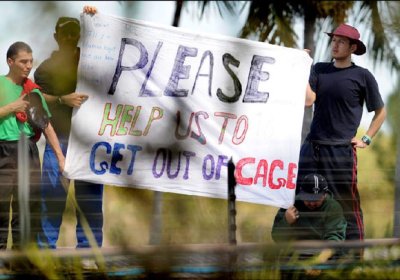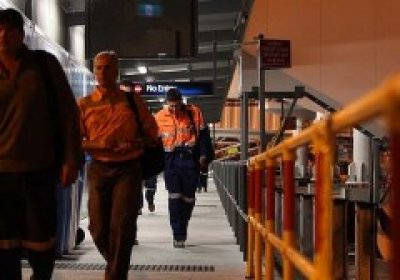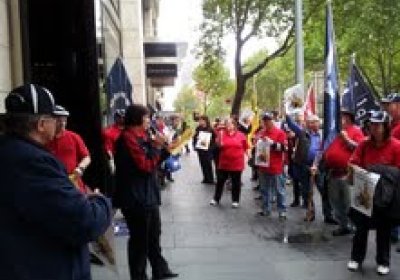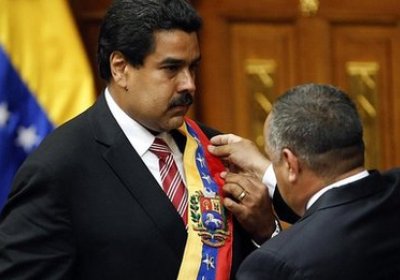The federal government’s plan to cut $2.3 billion from university funding is wrong. The government should end public funding to private schools and make mining companies and banks pay instead.
It makes no sense for Julia Gillard’s government to fund primary and secondary education by cutting $2.3 billion from the budget of university education.
Described as a “razor-gang”, the cuts to universities will turn a student scholarship scheme into a loans scheme, disadvantaging thousands of students.
Australia
An emergency speak-out: "Hands off Venezuela" was called by the Australia-Venezuela Solidarity Network (AVSN) at Sydney Town Hall on April 19. Almost 100 people attended the rally, plus a small counter-protest of about a dozen Venezuelan supporters of the right-wing opposition.
The rally called for "an immediate end to the opposition-initiated violence [in Venezuela], and to demand that the US and Australian governments come out and recognise [Nicolas Maduro] as Venezuela's head of state."
50 people rallied on April 18 to save the gender studies department from being cut at the University of Queensland.
UQ has been teaching gender studies for 41 years and it is the only university in Queensland that still does. The university has announced it will discontinue the gender studies major from this year and has plans to cut all gender studies courses by 2018.
Students marched from the great court to the UQ senate meeting where they were barred from personally delivering a petition signed by hundreds of students.
To mark the one-year anniversary of the shooting of four Aboriginal teenagers in Kings Cross, a rally will be held on April 26 to demand an end to police investigating cases of police violence.
The rally will gather outside the Kings Cross police station to voice disapproval of the police involved in the shooting of the unarmed youths in April last year.
Since January 1, 1980, over 200 Aboriginal and Torres Strait Islanders have died in police custody.
“We want our country to be alive. We don't want it to be dead because that’s our country, that’s our spirit country, we come from that country,” said Aboriginal traditional owner Teresa Roe to a crowd outside Woodside's office on April 12.
The gathering was a celebration after the announcement that Woodside Petroleum has shelved plan to build a liquid natural gas hub at James Price Point in Western Australia’s Kimberley.
Two years ago, refugee advocates learned five men detained in Darwin's Northern Immigration Detention Centre (NIDC) had sewn their mouths together and were protesting against delays to their cases. Advocates alerted the media of the self-harm in July, 2011.
But immigration spokespeople contacted by media denied lip-stitching had taken place. A spokesperson told AAP on July 2, 2011, that a detainee had been taken to hospital after an incident of self-harm, but: “Nobody has sewn their lips together.”
New research has found workers suffer many problems associated with working 12-hour shifts and rotating shifts. These problems include a disturbed body-clock, shortened and distorted sleep, and disturbed family and social life.
This resulted in acute effects on fatigue, mood and performance. Without adequate coping strategies, this leads to chronic effects on mental and physical health, including elevated risk of cardiovascular gastrointestinal problems, and heightened safety risks.
The NSW Coalition government’s decision to privatise two large ports was announced in July last year. It expected to receive $3 billion from the sale.
NSW Treasurer Mike Baird said on April 12 that the consortium NSW Ports would buy 99-year leases for two of the state’s international ports — Port Botany for $4.31 billion and Port Kembla for $760 million. The total cost of the sale would be $5.07 billion.
An additional yearly lease payment of $5 million would be paid to the government and the annual on cap container movement of 3.2 million would be abolished for Port Botany.
A 10-day hunger strike and protest carried out by a group of refugees in a Melbourne detention centre ended on April 17.
Twenty-seven refugees in the Melbourne Immigration Transit Accommodation centre in Broadmeadows were refusing food and water, and sleeping on the ground outdoors to draw attention to their lives in limbo.
Despite being found to be genuine refugees by Australia, they have been denied a protection visa due to adverse ASIO security checks. This means they will never be allowed to live in Australia, but cannot be deported because they have a genuine fear of persecution.
Australia Post workers are now in enterprise bargaining agreement (EBA) negotiations with their employer.
Last financial year Australia Post made an after-tax profit of $281 million after it paid the federal government a $213 million dividend. Workers have been falling behind the consumer price index which has grown 2.7% per year while wages only grew by 1%.
As Venezuelan people fight to have the elected government of Nicolas Maduro recognised, the nation’s democracy and election processes have been questioned by Australian media. Australians, as well as being told how lucky they are to live in such a prosperous country, are also told how lucky they are to live in a democracy where opinions are heard, unlike in other countries. But this onerous truism doesn’t really stand up to comparison. There have been some historical achievements in Australia, even if this was still marked by ugliness.
This is a speech given to a speakout in Sydney on April 10 against the Gillard government’s racism towards overseas workers employed on 457 visas.
***
What this debate is about isn’t a particular category of visa. What it’s about is racism, and the zero tolerance that Australian society and the Australian left should show for it.
Regardless of the other debates we might want to have about 457s, we should only condemn the kinds of contemptible dog-whistling Prime Minister Julia Gillard has been using those visas as an excuse for.
- Previous page
- Page 660
- Next page




